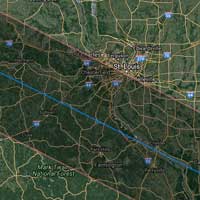Webster University Professors to Discuss How the Eclipse Affects Birds, Bees, Religion and Photography
July 11, 2017

ST. LOUIS - Just hours before the first coast-to-coast solar eclipse in North America in 99 years, several Webster University professors will give talks about solar eclipses and how they affect the world around us. The lectures are open to the public. Participants also will be invited to watch the eclipse with the professors, using special solar filter glasses supplied by Webster University.
Tours of the recently completed Browning Hall, Interdisciplinary Science Building will be offered. Additionally, a professor from Webster University’s Electronics and Photographic Media Department in the School of Communications will be on hand to answer any last-minute questions about trying to capture the eclipse on film.
Webster University’s Department of Biological Sciences in the College of Arts and Sciences is hosting the event at 11 a.m. Aug. 21 in the University’s East Academic Building, 545 Garden Ave., Webster Groves, 63119. The University’s home campus is in the narrow path of “totality,” meaning that those on campus during the event will see the sun completely blocked by the moon for approximately 75 seconds.
“We are inviting our friends, neighbors and family members to watch this rare and beautiful celestial phenomenon along with our students, faculty and staff,” said Physics Professor Ravin Kodikara, who is organizing the event. “We hope that our faculty will be able to add some perspective to the significance of this particular eclipse as well as help you set up your cameras to capture the event.”
The event will start with a brief welcoming ceremony, followed by a quick lecture about safety measures that will need to be taken to prevent sight damage during the eclipse. Kodikara will explain why eclipses can damage retinas as well as give a short talk about solar eclipses and why this particular eclipse is particularly special. Special solar eclipse viewing glasses will be distributed during the event. The University is providing the glasses as a courtesy but holds no responsibility for the misuse of the glasses during the eclipse. It is the responsibility of parents and guardians to make sure that children in their care are using the glasses properly.
Biology Professor Nicole Miller-Struttmann will give a short presentation on how solar eclipses affect the behavior of insects and birds. Religion Professor Chris Parr will discuss how solar eclipses have been referenced in religious texts, from ancient myths about what caused an eclipse to modern dooms-day cults that believe an eclipse is a sign of impending destruction. Photography Professor Bill Barrett will be available to answer questions from photographers before the event starts.
The two rooms hosting the lectures have a maximum capacity of 235 people, therefore seating will be on a first-come first-serve basis.
Besides the lectures, there will be hands-on science-related activities for grade-school children (ages 10 to 14) and a guided tour of the new Interdisciplinary Science Building. The total eclipse (when the moon completely blocks the sun) will start at 1:17 p.m. Central Time. Visitors will view the event from the top of Webster University’s parking garage.
If it rains during the event, the outdoor viewing will be canceled but the lectures will still be held. The University is planning to stream NASA's live video of the eclipse from various locations in the United States during the event in the East Academic Building.
While the event is free, organizers are asking attendees to register in advance so that the University can order a sufficient amount of solar eclipse glasses. A link to the registration is on the Solar Eclipse web page.
With its main campus in St. Louis, Missouri, USA, Webster University (www.webster.edu) comprises an action-oriented global network of faculty, staff, students and alumni who forge powerful bonds with each other and with their communities around the globe. Founded in 1915, Webster is a private non-profit university with nearly 16,000 students studying at campus locations in North America, Europe, Asia and Africa and in a robust learning environment online. The university is committed to ensuring high-quality learning experiences that transform students for global citizenship and individual excellence.
